The Rensselaer interactive debate on the future of the Web is just starting now and is being webcast live here (note: Silverlight required). You can watch the debate and submit questions – including while it is happening – by clicking here. Update: The debate is now over, see our comprehensive notes below…

Here’s a screenshot from Tim Berners-Lee’s opening presentation:
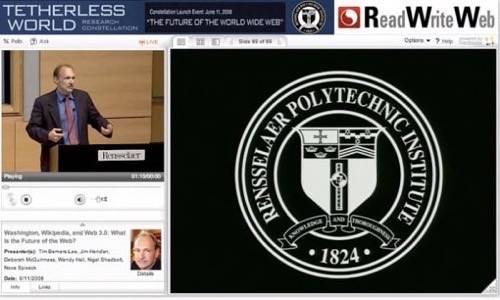
Is the Semantic Web a Dream?
The first question is about the Semantic Web — is it still just a dream? Nova Spivack of Twine says simply: yes! He says that the problem gets harder as more information comes on the web. You need to “disambiguate data”. The AI approach puts burden on the software. The Semantic Web approach puts the burden on the data itself, so it’s not about making smarter software – but smarter data.
He says there are technical and social challenges. Nova asks, rhetorically: is there an alternative to the Semantic Web, as the Web grows and scales? He says the HAL-9000 AI approach is an alternative, but it is not progressing much. Another solution is to “use the crowd”, and he says while this approach shows promise, it doesn’t scale to solve the problem. So both machine and human approaches won’t scale — hence the Semantic Web is the solution. He says “it’s a huge cultural project” and is a long term goal.
Deborah McGuinness from Rensselaer introduces the debate, including a mention of ReadWriteWeb as part of the debate’s “social media twist”.
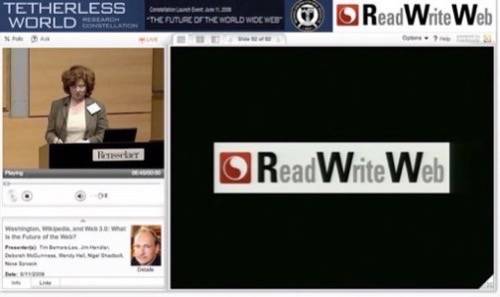
AI’s Role in the Web’s Future
Nigel Shadbolt is a Professor of Artificial Intelligence and Deputy Head of the School of Electronics and Computer Science at the University of Southampton, UK. He kind of defends AI, although he says we can expect “a very different form of AI” to what has gotten most of the press thus far. He says that we can expect “augmented collective intelligence”. He says “fragments of micro-intelligence” will evolve into an ecosystem, so AI will contribute to the future of the Web in that way.
Multi-lingual Web
The next question is about a multi-lingual Web. Wendy Hall is a Professor of Computer Science in the School of Electronics and Computer Science at the University of Southampton, UK. She talks about the Chinese Web, which has 5 billion pages that Google doesn’t index. She says that soon the dominant language on the Web will be Chinese, and much of that data will be via mobile phones. She says that a lot of “key sites” in the english language Web are not accessible in China, so the role of government will in a big way determine what will happen. She says that educating government all over the world will be important. The Web is already fragmented, but the solution isn’t to teach everyone english. So the Web Science Lab has been established in China and progress is being made there.
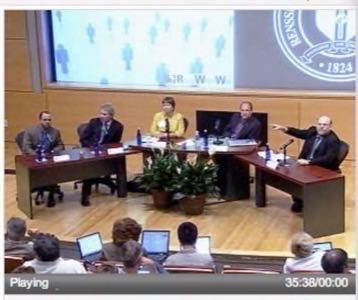
Nigel Shadbolt points out that different cultures frame information quite differently. So he says there must be multiple ways to represent content on the Web. Nova says that each culture has to map their content to a conceptual representation, and then globally we need to map different culture representations together.
Tim Berners-Lee says that sometimes that will work and sometimes it won’t. He says “the diversity of culture is really important” and he lists a kind of gradation of content that we can understand — e.g. 10% of Web content everybody can understand, x% we can’t understand, etc.
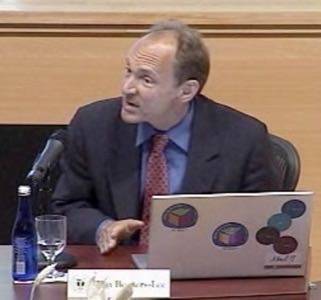
Democracy and the Web
A question from the audience about democracy. Wendy replies that the Web does have the potential to change the way we select politicians to represent us. So she says it’s been interesting to watch the US presidential election – Obama has been using new technology and could bring young people into the process. So the Web brings a wider representation of people to be involved in democracy. She says it has the potential to “dramatically change” the way we select governments, mentioning the self-organizing of Wikipedia. “You can well imagine something which can shift what we do” in democracy.
Nigel chimes in that the Web can both mobilize democracy, but also there is danger of “cyber vigilantism”. He mentions the dangers of a “rampant blogosphere”.
Nova also mentions the “threat to democracy” of the Web – he says “freedom is actually at risk”. He notes data logging and privacy issues. So he says it’s too early to tell how the Web will affect democracy – he says the Web was built on trust, but that nowadays the Web is being mis-used in some ways. So we need to be worried about that – encryption, privacy, etc are things to look out for.
Web Science?
There is a question about ontologies, but (ironically) the answer got rather complicated and so I lost the thread 🙂
Next an audience member asks: what’s the difference between Web Science and Computer Science? Wendy replies that Web Science is inter-disciplinary and it’s designed to get more people than just computer geeks into studying this domain.
Multi-modal Data; Can Semantic Web Capture Nuances?
The next, rather rambling, question from the audience is addressed to Nova and is about data. The question (when it eventually comes) is: what is the Semantic Web when it comes to different kinds of data (multi-modal, subtleties, nuances). Nova’s first response to this involved question: whoa! He then says that we have to start with the simple cases. He talks about time and calendars, semantic representation of events, etc. But he says the Semantic Web won’t capture the nuances of human interaction any time soon. He says “we’re not trying to replace human intelligence”, but “free up” human intelligence.
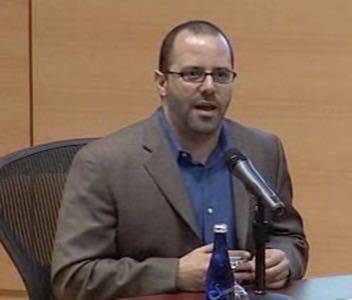
Nigel, coming from AI angle, says that behavior is a key part of the puzzle. He says understanding behavior, on a Web scale, is happening. He talks about sensors – where sensors report on data in our environment. ‘Ambiently intelligent environments’ is his term for this.
Tim’s response: “an ontology does not represent the same thing as a haiku does.” The audience laughs appreciatively. He interprets that as mening there are different languages for different things.
Will there be an Innovation in Logic?
The next question talks about “an innovation in logic”. For example “visual logics” will need innovation if the Web is to understand multi-modal information. Tim’s response is that logic has given us formalized reasoning, but it doesn’t describe how people think. So he doesn’t believe we need to formalize some kind of data as logic (e.g. the way people dance).
Nova says that we don’t have an equivalent of a functional MRI for the Web, in other words there aren’t enough ways to measure things on the Web. He says you need sensors and math to do measurements, rather than logic.
Conclusion
The final question is about data: how do you validate it, and if it’s to be shared, how to you manage privacy etc. Nigel points to Wikipedia as a way to validate information, self-correcting by people. Nova says reasoning is where the Semantic Web can help validate data, as well as the human self-correcting (e.g. wikipedia).
And that ends the debate. Feel free to contribute comments below!





















